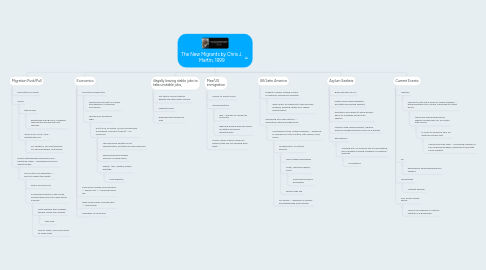
1. Migration Push/Pull
1.1. Difficulites on arrival
1.2. Social
1.2.1. kith and kin
1.2.1.1. Bhutanese men go first, establish themselves and women and families.
1.2.2. Urban Poor of PR, 1969 - Shantytown life.
1.2.2.1. Kin relations, PR men going to NY earning wages, until family
1.3. Martin distinguishes subjective and objective views ... perceived economic opportunities
1.3.1. Pull factors are 'expected' -- but not always the reality
1.3.1.1. homo-economicus
1.3.1.2. increasing industry in the North, pulling away jobs from agricultural industry
1.3.1.2.1. more workers then needed, people follow one another
1.3.1.2.2. rural to urban, and small areas to large areas
2. Economics
2.1. Formalist Perspective
2.1.1. examining concept of "supply and demand" of informal economies
2.1.2. demand for workers is high
2.1.2.1. post 1973, oil shock, More Economically Developed countries (MEDs) ... Oil recession
2.1.2.1.1. LED had more growth in job opportunities, but they still were leaving!
2.1.2.1.2. families become reliable sources of cheap labor,
2.1.2.1.3. Weber, 1922, wealth, power, prestige
2.2. small scale modes of production -- family unit --> cleaning family job
2.3. large scale mode of production -- corporation
2.4. individual vs collective
3. illegally leaving stable jobs to take unstable jobs,
3.1. Pull factor social mobility despite the step down socially
3.2. repetitive jobs
3.3. breadwinners taking any jobs
4. Mex/US immigration
4.1. Similar to Safa's UPPR
4.2. misconceptions
4.2.1. lazy - leaches on American economy
4.2.2. high end people leaving Mexico for better economic opportunities
4.3. Trump "When Mexico sends its people, they are not sending their best."
5. UK/Latin America
5.1. migrants usually finding niche's in cleaning, and service industry
5.1.1. 'brain drain' of migrants to low end jobs allowing, existing citizens for higher opportunities
5.2. Absorbing into host nations -- marketing cultural backgrounds
5.2.1. Columbians in the United Kingdom -- evidence of demand on Latin Culture, latin dance, food, music.
5.2.1.1. Globalization of cultural exports.
5.2.1.1.1. Salsa classes worldwide
5.2.1.1.2. Sushi, Theodore Bestor, 2000
5.2.1.1.3. British High Tea
5.2.1.2. SE Asians -- demand for butlers worldwide high-end families
6. Asylum Seekers
6.1. given benefits by EU
6.2. illegal versus legal migration and state sponsored support
6.3. education and desire to work doesn't apply to refugees and asylum seekers
6.4. Greece: high unemployment, adding political refugees that are more of a burden
6.5. perceptions
6.5.1. "melting pot" of America still accomodating, and Hungary refusing refugees on religious grounds
6.5.1.1. acceptance
7. Current Events
7.1. German
7.1.1. remnant of the past: wave of "guest workers" -- predominately from Turkey, supposed to return home
7.1.1.1. 1980s law preventing asylum seekers finding jobs for 3 months after arrival
7.1.1.1.1. in order to preserve jobs for existing citizens first
7.2. EU
7.2.1. assimilation and building asylum seekers
7.3. Technology
7.3.1. Internet sharing
7.4. KofI Annan quote above
7.4.1. food as an example of cultural identity in a globalized

